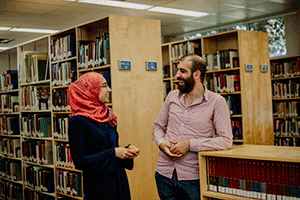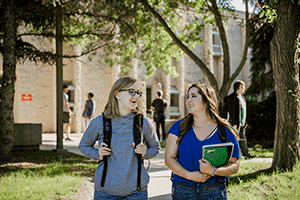Ready to learn more?
Get all the details straight to your inbox!

Luther College students are eligible for nearly $100,000 in academic awards – in addition to scholarships and bursaries awarded by the U of R.

Eating better means studying better. The Luther Cafeteria offers fresh, healthy, nutritious meals seven days a week with a self-serve “all-you-care-to-eat” concept students prefer.

The Luther Library has over 24,000 items in its collection, 5,000 books checked out per year, and 7,000 students who come through its door per month.

Luther College is a great choice for high school to university transition. Enjoy all the benefits of a larger campus, without feeling lost in the crowd. Our community is full of caring mentors and peers to ensure a positive student experience.

Luther College is recognized for its high standards of teaching, focused research, and one-on-one academic advising. We value and protect this heritage of excellence in scholarship, freedom of inquiry, and faithful seeking after truth.

Every degree program at Luther College offers a study abroad option and an optional experiential learning component where you gain real world experience and get paid while going to school!

Our student residence, The Student Village at Luther College, welcomes residents from ALL post-secondary institutions in Regina. Rooms come with a meal plan, free laundry, free wi-fi, and a great sense of community.

Wondering where to live? Our student residence, The Student Village at Luther College, is considered a great choice for first-year student accommodation. Individual private rooms mean you can stick to your own schedule and you never have to deal with roommate hassles.
Get all the details straight to your inbox!
Hyflex- online/onsite flexible Instructional Method. An introductory level course covering the principles of biology with examples taken from humans. * Note: This course is designed to apply the study of biological principles to humans. Biology majors cannot take this course for credit. Students cannot receive credit for both BIOL 140 and 150. Students who have credit for either BIOL 100 or BIOL 101 cannot subsequently receive credit for either of BIOL 140 or BIOL 150. *
Lab
Lab
Lab
This course and lab L07 are taught in French. An introductory level course covering the principles of biology with examples taken from humans. * Note: This course is designed to apply the study of biological principles to humans. Biology majors cannot take this course for credit. Students cannot receive credit for both BIOL 140 and 150. Students who have credit for either BIOL 100 or BIOL 101 cannot subsequently receive credit for either of BIOL 140 or BIOL 150. *
Lab (taught in French).
Online delivered course. An introductory level course covering the principles of biology with examples taken from humans. * Note: This course is designed to apply the study of biological principles to humans. Biology majors cannot take this course for credit. Students cannot receive credit for both BIOL 140 and 150. Students who have credit for either BIOL 100 or BIOL 101 cannot subsequently receive credit for either of BIOL 140 or BIOL 150. *
Online delivered lab.
The intent of this course is to provide a basic introduction to pathogens and the concept of diseases. This course covers bacteria, viruses and eukaryotes, with emphasis on emergent diseases and urgent challenges for public health. ***Prerequisite: BIOL 100 and BIOL 101*** *Note: Students who have received credit for BIOL 303 may not subsequently receive credit for BIOL 224.*
Lab
Lab
Lab
Lab
Research.
Aetiology, pathogenesis, diagnosis, treatment and epidemiology of infectious diseases of humans, caused by bacterial, viral, fungal and parasitic organisms. ***Prerequisites: BIOL 224 and 288***
This course develops students' proficiency in critical reading and writing through the study of a wide range of non-literary and literary texts, and the study of composition, with emphasis on connections between modes of reading and writing. *Note: Students who are planning to repeat ENGL 100 should seek academic advising before doing so*
Topic: Medicine and Mortality: Illness Narratives. Restricted to English/Science Bundle. Hyflex- online/onsite flexible Instructional Method. A study of a special topic in literature, which may include non-literary texts, in conjunction with a continuation of the writing program begun in ENGL 100. ***Prerequisite: ENGL 100.*** *Note: Every section of ENGL 110 has a different focus. Please consult the Department's Supplementary Calendar or the list of current course offerings on the Departmental website.* *Note: Students who fail ENGL 110 twice should contact their faculty or their federated college immediately.*
Topic: Children's Fantasy Literature. A study of a special topic in literature, which may include non-literary texts, in conjunction with a continuation of the writing program begun in ENGL 100. ***Prerequisite: ENGL 100.*** *Note: Every section of ENGL 110 has a different focus. Please consult the Department's Supplementary Calendar or the list of current course offerings on the Departmental website.* *Note: Students who fail ENGL 110 twice should contact their faculty or their federated college immediately.*
Topic: Literature of Winter. A study of a special topic in literature, which may include non-literary texts, in conjunction with a continuation of the writing program begun in ENGL 100. ***Prerequisite: ENGL 100.*** *Note: Every section of ENGL 110 has a different focus. Please consult the Department's Supplementary Calendar or the list of current course offerings on the Departmental website.* *Note: Students who fail ENGL 110 twice should contact their faculty or their federated college immediately.*
Online delivered course. A survey of Canadian Literature in English from the pre-twentieth century to the present day. ***Prerequisite: ENGL 100 and either ENGL 110 or completion of 24 credit hours.***
The craft of creative writing, with work in poetry, drama or non-fiction, and prose fiction. ***Prerequisite: ENGL 100 and either ENGL 110 or ENGL 152.***
This course will examine some familiar and unfamiliar literary representations of pirates, along with historical documents and contemporary accounts. We will consider the intersection of fiction and history, and will also consider how the popular image of the pirate comments on ideas of masculinity, ethics, and the individual’s relationship to the state. ***Prerequisite: ENGL 100 and either ENGL 110 or completion of 48 credit hours.***
Explanation of human placement in and interaction with the natural environment; assessment of concepts, processes, and patterns as related to distribution of human phenomena, including economic activity and settlement types. *Note: Students may receive credit for only one of GES 120, GEOG 120, or GEOG 220.*
The effect of political action on present-day geography, and of geography on political problems. ***Prerequisite: 30 credit hours including GES 100 or GES 120, or permission of the Department Head.*** *Note: Students may receive credit for only one of GES 330 and GEOG 330.*
This course explores the influence of the past on the world in which we live. Topics addressed will be taken from today’s headlines and will reflect a wide variety of periods and geographical areas. Topics may include terrorism, environmentalism, war, demonstrations, popular culture, the welfare state, global crises.
An introduction to the histories and diverse cultures of Africa from the earliest times to the era of colonization in the 19th century. Attention is given to the roots of African peoples in antiquity, processes of regional differentiation, and evolving patterns of trade, politics and conflict. ***Prerequisite: One 100 level HIST or completion of 15 credit hours***
An introductory class in the theory and techniques of differentiation and integration of algebraic and trigonometric functions. Topics include limits, optimization, curve sketching, and areas. ***Prerequisite: Precalculus 30 with at least 75%, or Calculus 30 or Mathematics B30 and C30 with a grade of at least 65% in each or Math 102*** *Note: Students can receive credit for only one of MATH 103 or 110* Labs will start from the second week.
Lab
Differentiation and integration of exponential and logarithmic functions; methods of integration and applications; indeterminate forms, L'Hospital's rule and improper integrals; sequences, series, power series and Taylor series. ***Prerequisite: MATH 110, or MATH 103 with a grade of at least 80%***
Lab
A course intended to introduce students to elementary linear algebra, particularly at a computational and applied level. Topics include matrices and systems of equations, inversion, determinants, vectors, inner products, eigenvectors and eigenvalues. ***Prerequisite: Precalculus 30, Mathematics B30 and C30, or Math 102.***
Lab
Ordinary differential equations, modelling with differential equations, Laplace transforms. ***Prerequisite: MATH 111 and MATH 122***
Classification and basic properties of equations, separation of variables, Fourier series, Sturm-Liouville theory, Fourier and Laplace transforms. ***Prerequisite: MATH 381.***
The Cauchy problem, the Fredholm alternaive in Banach space, the potential equation, the Dirichlet problem, the heat equation, Green's functions, and the separation of variables.
This course is geared toward MAP students majoring in music, who have successfully completed MUHI 202. This course traces the development of important early musical styles, genres, and forms by placing representative composers and selected musical works into their appropriate socio-cultural and historical contexts. Emphasis is on students honing their listening, writing, research and presentation skills. ***Prerequisite: MUHI 202 or permission of Department Head*** *Note: Students cannot receive credit for both MU 203 and MUHI 203*
How was music performed in various places at various times in the past? This course investigates how and why musical interpretation changed over time and explores how it shapes present-day approaches to “early music” through consideration of original sources and contemporary commentary. Editions may be prepared and performed. ***Prerequisite: MUHI 203 or permission of department head.*** *Note: Students cannot receive credit for both MU 415 and MUHI 415*
Online delivered course. An introduction to the nonprofit and voluntary sector in Canada and the organizations that comprise it. The course examines the history, size, scope, and roles of the sector in society, relationships with government and other sectors and accountability in the context of governing and managing a private not-for-profit corporation. *Note: Students may receive credit for one of NSLI 100, IDS 290AA or NSLI 200.*
Online delivered course. Theoretical and practical consideration of nonprofit advocacy work, including power structures and systems, government structures, community development and organizing, and networking and engaging community residents to achieve changes in public policies and programs and to educate about societal problems. Legal restrictions on charities' advocacy are examined. ***Prerequisite: NSLI 100 or 12 credit hours, or permission of the Program Director.*** *Note: NSLI 100 may be taken concurrently.* *Note: Students may receive credit for one of NSLI 220, NSLI 320, IDS 290AE, or JS 384.*
Online delivered course. Financial management and philanthropy, focusing on diverse funding sources and formulas: governments, donors, corporate sponsorships, fundraising, social enterprises, etc. Introduction to financial monitoring systems, roles in nonprofit organizations, creating and monitoring annual budgets, internal and external reports and procedures, cost accounting methods, long range financial planning, building capacity for innovation. ***Prerequisite: NSLI 100 or 12 credit hours, or permission of the Program Director.*** *Note: NSLI 100 may be taken concurrently.*
This introduction to philosophy will explore how philosophy can provide answers to some of the more profound questions we face, such as questions concerning knowledge, truth, mind and body, personal identity, free will, morality, politics, reasoning and the existence of God. * Note: Topics will vary with sections of this course *
An introduction to the systematic study of reasoning, this course will teach the theory and practice of good reasoning. It will provide students with reasoning skills that are useful in whichever discipline and career they may pursue.
An introduction to the study of adjustment, disorders, development, personality and the social environment of the person.
Hyflex- online/onsite flexible Instructional Method. An introduction to biological, cognitive, and social aspects of psychological development across the lifespan. ***Prerequisite: PSYC 101 and PSYC 102.***
Online delivered course. An overview of the field of forensic psychology – the intersection of psychology and the law. Topics include: psychology of police investigations, deception, eyewitness testimony, child victims and witnesses, juries, mental illness in court, sentencing and parole, domestic violence, sexual offenders, psychopathy, risk assessment, and special offender populations. ***Prerequisite: PSYC 101 and PSYC 102, or 60 credit hours and permission of the Department Head.*** *Note: Students may receive credit for one of PSYC 321 or PSYC 320 as a forensic course.* *Note: This course will initially be restricted to PSYC majors and Certificate in Forensic Psychology students. Non-majors will be eligible to register at a later point if space remains.*
This course examines biological, personality, and social theories and empirical research in the context of understanding criminal and violent behaviour. Topics covered will include: offender assessment and classification, offender treatment, criminal pathways to and desistance from crime, prevalence, and types of offenders. ***Prerequisite: PSYC 101 and PSYC 102.*** *Note: This course will initially be restricted to PSYC majors and Certificate in Forensic Psychology students. Non-majors will be eligible to register at a later point if space remains.*
This course will include historical and philosophical foundations of positive psychology while reviewing related disciplines and discussing their contributions to the field. Some areas of focus will be: well-being, virtues, values, strengths, self-actualization, love and friendships, resilience, positive affect, optimism and hope, gratitude, lifespan, and organizations. ***Prerequisite: PSYC 101 and PSYC 102.*** *Note: This course will initially be restricted to PSYC majors. Non-majors will be eligible to register at a later point if space remains.*
A research thesis in psychology. **Permission of the Department Head is required to register.** *Note: This course will initially be restricted to PSYC majors. Non-majors will be eligible to register at a later point if space remains.*
A research thesis in psychology. **Permission of the Department Head is required to register.** *Note: This course will initially be restricted to PSYC majors. Non-majors will be eligible to register at a later point if space remains.*
Thesis research.
Thesis research
This course is intended to expand the breadth of knowledge and skills of Experimental and Applied Psychology Doctoral students under the guidance of a supervisory committee of psychology faculty members. The examinations are conducted by graduate program faculty and can take an oral or written format or a combination of both. ***Prerequisite: Completion of 18 credit hours and permission of the Experimental and Applied Psychology Graduate Program Chair.*** *Note: This course is to be taken after the completion of all required course work.*
Hybrid- onsite classroom Instructional Method. An introduction to the academic study of religion; a survey of the thought and practices of major world religions; the impact of religion on society and culture.
Online delivered course. An introduction to the foundations of Christianity dealing with topics such as the centrality of the story of Jesus, its roots in Judaism, its sources of authority, characteristic practices, historical and theological development, major denominational families. Some contemporary issues may also be briefly outlined. ***Prerequisite: Completion of 12 credit hours or RLST 100.***
Hyflex- online/onsite flexible Instructional Method. An exploration of beliefs and practices regarding health, disease, healing and mortality in a variety of religious traditions, and how these affect individual and community health. Includes an examination of empirical studies of religion and health outcomes and concludes with the implications for health care policy and practice. ***Prerequisite: Completion of 12 credit hours or RLST 100.*** *Note: Students may receive credit for one of RLST 230 or RLST 290BB.*
Remote - synchronous Instructional Method. This course surveys the role and religious experiences of women in various world religions. Lecture material will cover the accumulated traditional teachings on women and the feminine in each religion, with attention to specific historical developments. Contemporary scholars and issues will be highlighted with an emphasis on feminist methodologies. ***Prerequisites: Completion of 12 credit hours or RLST 100 or WGST 100.***
Hyflex- online/onsite flexible Instructional Method. This course explores the Muslim encounter with the modern age. It examines the traditional religious stance of the Islamic community, and the significant movements and influences that have affected it. It studies specific problems faced and decisions taken, and analyzes adaptations and tensions in Islamic faith and life resulting from the encounter. ***Prerequisite: Completion of 24 credit hours or a 200 level RLST course.***
Honours essay. ** Permission of the Department Head is required to register. **
An introduction to statistical methods; descriptive statistics; the normal distribution; basic techniques of statistical inference; confidence intervals and hypothesis tests for population means and proportions; simple linear regression; and one-way analysis of variance. ***Prerequisite: Foundations of Math 20 or Precalculus 20 or Apprenticeship & Workplace Math 30 or MATH A30 or AMTH 091 or MATH 101*** *Note: STAT 100 and STAT 200 are designed to provide a year-long introduction to statistical methodology with a view towards applications and are not intended for majors in statistics, actuarial science, or any other program requiring a detailed knowledge of statistics. Students who receive credit for STAT 100 may not receive credit for STAT 160*
A continuation of STAT 100; inference for two categorical variables; basic multiple linear regression; two-way analysis of variance; introduction to nonparametric methods; statistical process control; introduction to survey design. ***Prerequisite: STAT 100*** *Note: STAT 100 and STAT 200 are designed to provide a year-long introduction to statistical methodology with a view towards applications and are not intended for majors in statistics, actuarial science, or any other program requiring a detailed knowledge of statistics. Students who receive credit for STAT 200 may not receive credit for STAT 160*
Remote - synchronous Instructional Method. How do feminist principles translate into political action, public policy, organizational structures, artistic or religious movements? Why have some movements been successful where others failed? We will examine this "dance" through the context and biographies of suffragette leaders, feminist global movements, and engage in service learning at successful feminist agencies. ***Prerequisite: WGST 100 or permission of instructor*** *Note: Formerly numbered WGST 280AG. Students may receive credit for only one of WGST 206 or WGST 280AG.*
Honours essay. ***Prerequisite: Admission to the Honours program.*** **Permission of the Department Head is required to register.**